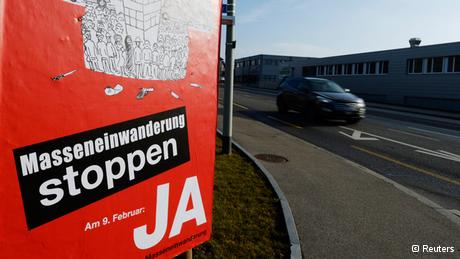I’m no fan of democracy, but even a broken clock gets it right twice a day. On Sunday, a majority of Swiss voters made the wise decision to vote in favor of a proposal driven by the nationalist Swiss People’s Party which would see the reintroduction of immigrant worker-quotas and preferences for Swiss-nationals when filling job vacancies, in addition to further restrictions on immigrants’ rights to social benefits. The proposal also stipulates that Switzerland will have to renegotiate its bilateral accord with the EU on the free movement of people within three years or revoke it. The proposal was approved by a narrow margin of 50.3%. The acceptance of the proposal was predictably marked by immediate antagonism from the liberal media, with the St. Galler Tagblatt describing it as ‘rationally inexplicable’.1
Interestingly, this sensible proposal received much more support in the eastern German and Italian cantons than in western French cantons, and also much more support in rural than urban areas. In the far west, in the French cantons of Vaud (which includes the major city of Laussane) and Geneva, a whopping 61% of voters rejected the proposal – the highest margin in all of Switzerland. The highest percentage of votes in favor of the proposal (68.2%) was recorded in the southern-based Italian canton of Ticino, where, in addition to the Swiss People’s Party, the Ticino League, with close ties to Lega Nord in Italy, represent the true interest of the Ticinese people. The second-highest number of favorable votes was recorded in the smallest and undoubtedly the most traditionalist canton in Switzerland, the German Catholic canton Appenzell Inner Rhodes, with a vote of 63.5%. It was also the only canton out of a total of 26 to approve a proposal driven by conservative Christians to drop the funding of abortions from basic health insurance, also voted on via a referendum on Sunday. While in the whole of Switzerland the proposal was rejected by 69.8% of voters, Appenzell Inner Rhodes approved it by a small margin of 51%.2 As with the November 2009 referendum, in which the banning of mosque minarets was approved,3 Appenzell Inner Rhodes recorded the most radical vote.
The Swiss pride themselves on a long tradition of subsidiarity, and their constitution guarantees a great deal of autonomy to cantons, with each maintaining its own constitution, legislature, government, and courts, an arrangement which has proven very beneficial to its people. Its 1848 constitution is closely modeled on that of the United States.4 In theory, this means that the Swiss system is more traditionalist than most those of most modernist nation-states, which tend towards centralization. Edmund Burke argued thus for the traditional principle of subsidiarity against this modernist tendency:
It is boasted that the geometrical policy has been adopted [by the French Revolutionaries], that all local ideas should be sunk, and that the people should no longer be Gascons, Picards, Bretons, Normans; but Frenchmen, with one country, one heart, and one Assembly. But instead of being all Frenchmen, the greater likelihood is, that the inhabitants of that region will shortly have no country. No man ever was attached by a sense of pride, partiality, or real affection, to a description of square measurement. He never will glory in belonging to the Chequer No. 71, or to any other badge-ticket. We begin our public affections in our families. No cold relation is a zealous citizen. We pass on to our neighbourhoods, and our habitual provincial connexions. These are inns and resting-places. Such divisions of our country as have been formed by habit, and not by a sudden jerk of authority, were so many little images of the great country in which the heart found something which it could fill. The love to the whole is not extinguished by this subordinate partiality.5
However, now that Appenzell Inner Rhodes’ vote on public abortion-funding is at odds with the rest of the country’s, the question remains whether the Swiss Federal Supreme Court will continue to implement suppressive feminist measures on the people of Appenzell Inner Rhodes, such as when it forced female franchise on them in 1990.6
A concluding observation: ironically, Appenzell Inner Rhodes, which until today remains more than 80% Roman Catholic, split from Appenzell Outer Rhodes on the principle of cuius regio, eius religio, escaping conflict with the Protestants who formed a majority in the latter region by 1529.7 The tragic vote recorded yesterday in Geneva has already been noted, and, tragically, more than 60% of the historically Protestant Appenzell Outer Rhodes voted in favor of the public funding of abortion.8 Being a devout Protestant myself, I feel obliged to use this embarrassment as an opportunity to call upon all Occidental Protestants to search our souls and actively strive to liberate ourselves, with the power of God’s grace, from the destructive influence the Enlightenment has had on our faith over the last 250 years, in addition to learning from some other traditions of Christianity possibly less infiltrated by Enlightenment thought.
Footnotes
- http://www.swissinfo.ch/eng/swiss_news/Newspapers_stress_significance_of_immigration_vote.html?cid=37920080 ↩
- http://www.swissinfo.ch/eng/swiss_news/Vote_results.html?cid=37851262 ↩
- http://en.wikipedia.org/wiki/Swiss_referendum,_November_2009 ↩
- http://www.swissinfo.ch/flash/politics/timeline/index-eng.html ↩
- Burke, E. 2003. Reflections on the Revolution in France. (edd. Turner, Frank M. and McMahon, Darrin M). New Haven, CT: Yale University Press. p. 167 ↩
- http://en.wikipedia.org/wiki/Appenzell_Innerrhoden#Division_of_Appenzell ↩
- http://en.wikipedia.org/wiki/Appenzell_Ausserrhoden#Division_of_Appenzell ↩
- http://www.swissinfo.ch/eng/swiss_news/Vote_results.html?cid=37851262 ↩
| Tweet |
|
|
|





